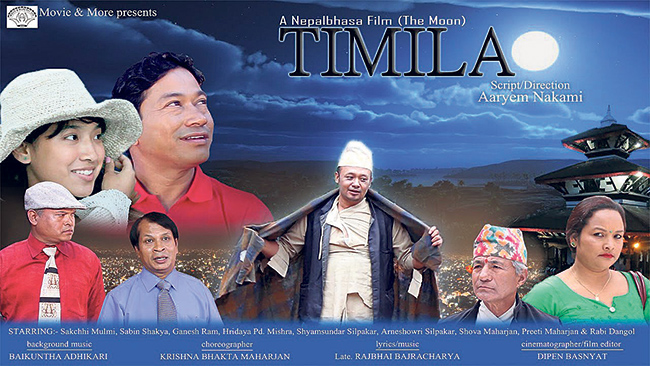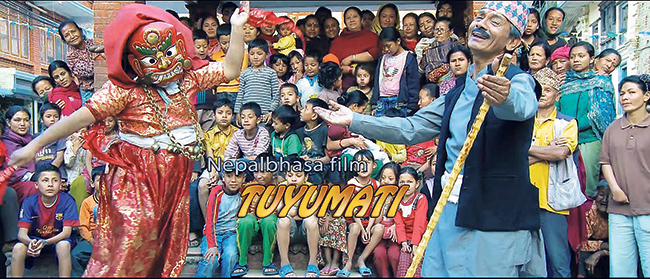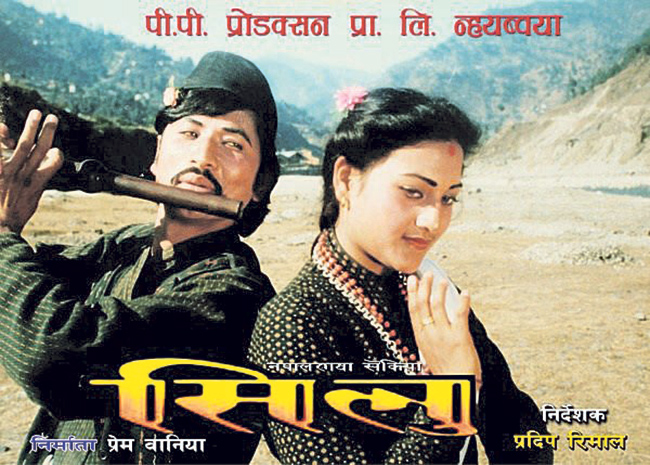KATHMANDU, Sept 10: Awards motivate most of the artists in the world as they are the reorganization of one’s hard work and talent. Moreover, awards make artists feel that their dedication is being noticed in the society.
With the aim to promote Nepal Bhasa artists, the third edition of ‘Page 3 People’s Choice Award’ is scheduled to take place on September 16 at Rastriya Naach Ghar, Jamal, according to a press meet organized by Elohan Prakashan Pvt Ltd at Bento Café, Basantapur on Saturday.
The award is held once in every three years and is divided into three main categories as well as several sub-categories. The three main categories are – Page 3 Nepal Bhasa Movie Award, Page 3 Nepal Bhasa Music Video Award and Page 3 Nepal Bhasa Song Award. There are 18 sub categories for cinema, seven sub categories for music video and eight sub categories for songs. Besides that, the ceremony also confers a life time achievement award. Senior musician Bishnu Jalmi will be honored with the title this year.
Journey of Nepal Bhasa cinema
It is believed that artists and their works get a widespread appreciation as well as promotion due to the awards they receive. So, the Page 3 People’s Choice Award was introduced after the organizers felt the need to appreciate and encourage people that are involved in creating music and cinema in Nepal Bhasa.
Tamang and Nepal Bhasa languages officially recognized in Bagma...

 The journey of Nepal Bhasa cinema began with the movie ‘Silu’, released in 2044 BS. It is the first indigenous movie made in Nepal in celluloid. Although around 200 Nepal Bhasa movies have been made ever since, only a few of them go through the Censor Board of Nepal.
The journey of Nepal Bhasa cinema began with the movie ‘Silu’, released in 2044 BS. It is the first indigenous movie made in Nepal in celluloid. Although around 200 Nepal Bhasa movies have been made ever since, only a few of them go through the Censor Board of Nepal.
 About this, General Secretary of Newa Film Society Biraj Rajopadhyaya said, “It has been 30 years of Nepal Bhasa movies, but less than 10 such films have gone through the Censor Board of Nepal. The few films that went through the Censor Board are ‘Silu’, ‘Rajamati’, ‘Patachara’, ‘Balama Maiju’ and ‘Swonegu’, among others. Since most of the movies do not go through the Censor Board, it is not possible for us to get a proper data on Nepal Bhasa movies.”
About this, General Secretary of Newa Film Society Biraj Rajopadhyaya said, “It has been 30 years of Nepal Bhasa movies, but less than 10 such films have gone through the Censor Board of Nepal. The few films that went through the Censor Board are ‘Silu’, ‘Rajamati’, ‘Patachara’, ‘Balama Maiju’ and ‘Swonegu’, among others. Since most of the movies do not go through the Censor Board, it is not possible for us to get a proper data on Nepal Bhasa movies.”
Biraj informed that it is important for Nepal Bhasa movies to go through the Censor Board to get a legal status. “This will allow Nepal Bhasa movies to be released in cinema halls like any other Bollywood, Hollywood and Nepali movies. Without going through the censor board, though the Nepal Bhasa movies can be showcased at film festivals, they cannot be sold through cinema halls,” added Biraj.
 The reason why Nepal Bhasa movies do not go through the Censor Board is because the process is too costly for the indigenous film makers. While in average an entire film is developed at the cost of Rs 100,000 to Rs 300,000, the process to go through the Censor Board alone costs around Rs 25,000.
The reason why Nepal Bhasa movies do not go through the Censor Board is because the process is too costly for the indigenous film makers. While in average an entire film is developed at the cost of Rs 100,000 to Rs 300,000, the process to go through the Censor Board alone costs around Rs 25,000.
Adding more to this, Darshan Bir Shakya, vice-president of Newa Film Society, said, “Indigenous filmmakers make movies with sentimental value and do not care about making profit. They hesitate to spend extra money for promotion and going to the Censor Board because they are satisfied by making a movie and showing it to their closed ones. However, in order to cash in the potentialities of Nepal Bhasa cinema, the filmmakers should focus on professionalism. Promotion and commercialization of Nepal Bhasa movies will eventually help the filmmakers garner more profit and a larger audience.”
 Biraj said, “Filmmakers should understand that the money they spend on censor board is also a form of insurance. Their movies get to compete for national as well as international awards, eventually helping in promoting indigenous culture and identity.”
Biraj said, “Filmmakers should understand that the money they spend on censor board is also a form of insurance. Their movies get to compete for national as well as international awards, eventually helping in promoting indigenous culture and identity.”
Existing challenges and the future
It’s a challenge for indigenous cinema like Nepal Bhasa movies to get through the censor board even if they wanted to. The reason being, some rituals and customs of indigenous people shown in the films are described as offensive by the Censor Board of Nepal.
“It is true that Nepal Bhasa filmmakers are not aware about the perks they are entitled to if they release their films after going through the Censor Board. However, there are various other factors that prevent the filmmakers from reaching out to the Board. For example, it is in Newari culture to have alcohol during festivals and celebrations, but this very scene in a movie becomes unacceptable on the part of the Censor Board.
Similarly, ‘Dumb Mountain’ is a Nepal Bhasa movie about a traditional musical instrument where a drum’s body is made of cow skin. The movie was rejected by the Censor Board because cow is our national animal and the use of its skin was deemed offensive. These kinds of cuts and rejections wipe out the movies’ core essence, making them meaningless,” said Darshan.
Biraj added, “The solution to this, in the current scenario, is either having a separate censor board for indigenous cinema or to have representatives from the indigenous community at the Board. Leniency in cost while registering the films at Censor Board can also be another possible solution.”
Indigenous cinema is considered the forth category of cinema -- mainstream films being in the first category, art films the second and documentaries the third. Moreover, an indigenous movie should feature authentic culture of a particular community so as to represent their culture. “Today’s trend in Nepal Bhasa is all about copying Bollywood movies, and this is making the films less credible,” said Biraj.











_20231029092247.jpg)
























